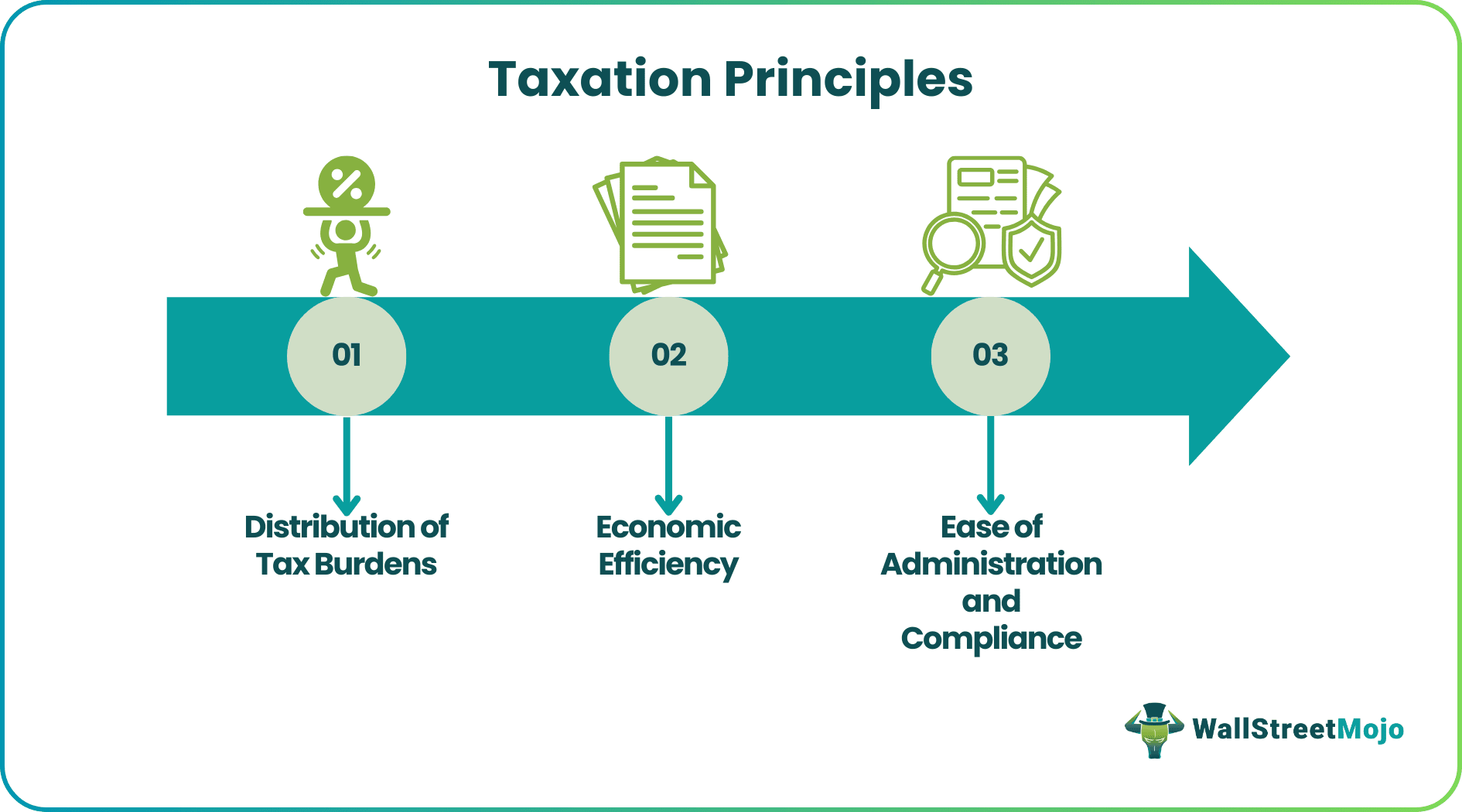Table Of Contents
What are Taxation Principles?
Taxation Principles are guidelines that help lawmakers and governing bodies formulate strategies and plan their execution to ensure a robust tax structure to increase revenues and bring social and economic equality to its citizens.
Explanation
Taxation principles ensure that its subjects play an equal role in building a healthy and strong economy per their respective abilities. To do so, it is imperative that the tax structure is fair and is not harsh on any particular section of society or individuals. It should be easily understandable and devoid of any ambiguities. Certain guidelines are commonly known as taxation principles to ensure all these conditions are met.
Top 3 Principles of Taxation

#1 - Distribution of Tax Burdens
The first and foremost guideline in this part is the concept of horizontal equity. This concept is based on the assumption that individuals at similar levels should have the same tax obligation. This principle guides the regulators or lawmakers to ensure that a realistic distribution policy is in place. How simple it may sound, it is easily and equally violated in national and international circles. The basic reason is that lawmakers consider their duty to uplift the poor and weaker sections of society compared to the privileged ones. Hence more often than not, you would see farmers and homemakers getting relaxed reforms compared to the middle and service classes. However, it remains debatable if this deviation is the right option.
The supporters of this option empathize with the guiding principle -The ability to pay. This recommendation is based on the notion that the tax burden should be distributed in such a way that it takes care of the capacity of the person to bear that tax liability. The taxes that suit this notion are income taxes, while the service charges can be an example of the former category. However, an important argument here is that the individual tax-bearing capacity should be deduced not based on what he earns but on what he spends or consumes. Whatever the thinking process, the ability to pay weighs heavily on equal distribution guidelines, and that’s why we see a slab-based structure for income tax calculation.
#2 - Economic Efficiency
In many ways, the requirement that the tax system is efficient stems from the notion that markets are self-correcting and perfect. Normally the economic laws of supply and chain ensure that the market is efficient and the economy is robust. Hence in ideal scenarios, tax policies and guidelines should not interfere with the consumption, production, and supply chain cycles.
However, there is no reason to believe such a status quo would always be maintained. The taxation system, at times, should interfere with ensuring that economic and social goals are realized. An example can be levying higher tax rates on cigarettes and alcohol in comparison to other commodities to discourage people from consuming these sin products.
#3 - Ease of Administration and Compliance
While framing tax structures, the regulating body should ensure that these are managed with the utmost accounting framework and liabilities. These should be crystal clear without ambiguity, stable for the economy and society in general, cost-effective, and convenient. These factors become more of a threshold rather than just a guiding principle in developing markets compared to developed ones. This is because of illiteracy, lack of proper channels to resolve ambiguities, and prevalent administrative challenges.
Consider the example of the first virtue – clarity. If the taxation rules are unclear or have too many twists and turns, it would be difficult for the common public to understand them. And even if they do understand them, they might not be able to take their full advantage and may end up calculating the unfair tax on their own. There can be a difference in tax liability and tax payable as common people might not be able to take advantage of various tax-saving opportunities. They might have to reach out to tax experts to seek guidance, which would have an economic cost of its own. These scenarios are very common in developing economies.
Importance
Though the taxation system is focused on increasing the government's revenue, it can also be used to revive the economy. Let’s discuss this aspect in detail. Public expenditure tends to increase as the economy grows or more quantifiably as the GDP numbers grow. Taxation is the only mechanism that ensures lawmakers' revenues increase proportionately. This growth is indispensable as to maintain economic growth, the government must spend on infrastructure, which acts as a foundation on which economic growth survives.
However, in bad times these taxation policies can help the government in reviving growth and stabilize the faltering economy by tweaking tax structures here and there temporarily. Hence, robust taxation not only ensures that the government revenues are intact and growing at a healthy pace but also ensures that these can be used as growth engines in times of recession.
Conclusion
No second thought that taxation is one of the primary sources for the government to raise revenues, ensuring its expenditure is met. However, one should not underestimate its importance in bringing equality and upliftment to the weaker sections of society. Without a proper taxation structure, economies may crumble as there will be no capital to improve infrastructure, which can have catastrophic effects on the economy.
